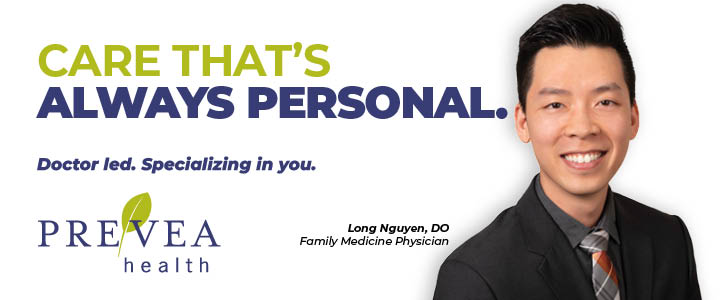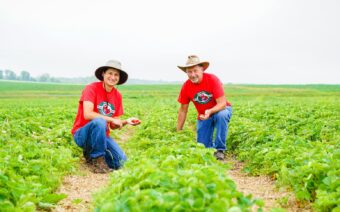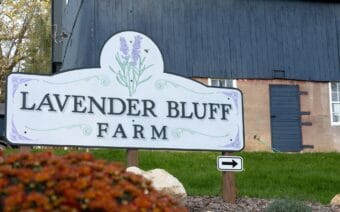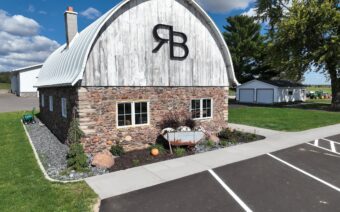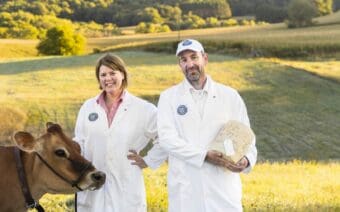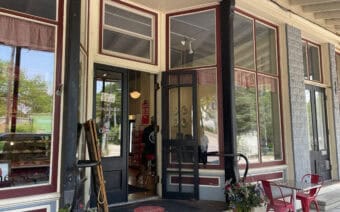
May 27, 2024
BLOOMER – Dairy farms have always been a well-known staple of Wisconsin – hence the nickname: America’s Dairyland.
With more than 6,000 dairies calling it home, the Badger State still holds the title for most in the country.
What is lesser known, however, are the businesses that support the dairy farms’ operations.
One such business is Bloomer’s Golden Calf Company – which manufactures colostrum pasteurizers, bags and tube feeders for dairy farms.
“What we do is make tools that help dairy farmers do a good job feeding colostrum on the first feeding,” Co-owner Dagmar Beckel Machyckova said.
A calf’s first feeding, Machyckova said, is incredibly important for the cow’s lifelong health.
“Unlike human babies, calves are born without immunity,” she said. “A human baby gets immunity through the placenta because our placenta is permeable. But in cows (the transfer of immunity) is limited because the placenta is intended to protect the calf, so the large molecules of immunity aren’t able to pass directly to the calf in utero through the placenta.”
That, Machyckova – who owns Golden Calf Company with her husband, Andrew – said is where colostrum comes in.
“The mechanism Mother Nature has is that the cow takes all that good immunity, insulin, nutrients, hormones and resources and puts it into the first milk,” she said.
What Golden Calf Company does, Machyckova said, is manufacture tools to help support dairy farmers in making sure their calves receive the best first milk possible.
“We have tools where we can measure the quality of the immunity in the colostrum so we know whether or not the quality is good enough to feed it to them for their first feeding,” she said.
Machyckova said according to research from the University of Minnesota and Cornell University, not only does the quality of the colostrum matter, but so, too, does the timeframe in which the calf receives it.
That is because, she said, in the first few hours after a calf is born, its stomach is permeable and can absorb the immunoglobulins contained in colostrum directly into its bloodstream.
With it closing within four hours of birth, she said, there is “a short opportunity to get colostrum in.”
“The sooner the caretaker of the animal can feed the calf the colostrum, the sooner the calf can absorb it and the sooner it is protected,” she said.

Keeping in mind the amount of colostrum the calf is getting, the quality of the colostrum the calf is getting and what is being done to manage the bacteria of the colostrum – “because it doesn’t come out of the cow sterile” – Machyckova said, “is a lot to manage on a day-to-day basis.”
That’s where businesses like Golden Calf Company and its colostrum management systems come in, she said.
“Farmers will use our tester to test the quality of the colostrum, collect it into our four-liter, three-liter and two-liter sized colostrum bags, run it through our pasteurizer and then put it into the freezer so they basically have prepackaged meals to go,” she said. “When a calf is born, they can go into the freezer, pick the kind of quality corresponding to that calf, put it back into our unit to warm it up to the proper temperature quickly and then feed it to the calf.”
Machyckova said Golden Calf Company’s goal is to supply dairy farms with the right tools to achieve a consistently healthy calf population.
“Colostrum is the single most important thing determining how healthy an animal is going to be for the rest of its life,” she said. “We know calves and the environment they live in – they want to suckle on things, and they don’t know that it’s a gate covered in manure. Or they may try to stand up for the first time and take a nosedive – there is going to be dirt and bacteria on the floor where they were born, just by the nature of it.”
Colostrum, Machyckova said, not only protects the calf from getting sick, it also helps kick start its growth.
“Colostrum also contains coaching cells and kickstarts the whole system of the calf to start developing – kind of like saying, ‘hey, you are out of the womb, you need to start doing things yourself,’” she said. “It stimulates the calf’s growth and protects it from getting sick.”
Machyckova said it’s similar to building a skyscraper.
“If you don’t have a solid foundation, you can only build a single-story house,” she said. “If you have a foundation that goes deep – you can build a skyscraper. That’s what quality colostrum does for a calf.”
Supporting the long-term health of a cow starting at the first few hours, Machyckova said, in turn, supports the farm’s overall bottom line.
“If you feed the four liters within the first half hour and you do it at the right temperature with the right volume, you will have a healthier animal – which means fewer pharmaceuticals, which translates directly into the costs on the dairy farms and makes the farm more profitable,” she said. “We also know it directly affects the volume of milk the cow will produce as a mature animal – so again, translating into profitability for dairy farms.”
Made in the U.S.A.
Machyckova said all Golden Calf Company equipment is designed, tested and manufactured in the United States.
Starting Golden Calf Company in 2010 in their garage, she said they initially utilized European colostrum management products – but quickly realized that wasn’t going to work for American dairy farmers.
“(The European systems) quickly proved to be insufficient for the American market demand,” she said.
On average, Machyckova said European dairy farms have 150-300 cows, which means they have “about one calf every two days.”
“Our largest single-site dairy farm in the United States is 30,000 cows, resulting in 80 calves per day,” she said. “So, we found out quickly that the American customer is completely different from the European one.”

Recognizing that, Machyckova said, “we put a ton of hard work, sweat, tears and engineering into designing products that work well for American farmers.”
The European colostrum management system, she said, held two meals, “our Calf Hero product line holds 12.”
“To accommodate the size, we made a ton of changes,” she said. “We’re using American stainless steel, and we are trying to source locally as much as possible, so we work with manufacturers in the Chippewa Valley for stainless steel. We have a local welder – it’s focused on doing as much as we can in the Midwest.”
The industry itself, Machyckova said, has evolved significantly over the last several years.
“In the early beginning, we were advocates for people feeding colostrum – just feed it,” she said. “What we are doing today is working with customers who want to feed two and three feedings six to eight hours apart because they understand the value of colostrum.”
Evolving with the industry
The evolution of the industry, Machyckova said, prompted Golden Calf Company to evolve as well.
“We developed four-, three and two-liter bags and color-coded them – (red: two liters; black: three liter; and blue: four liters) – so they are visually easier to tell apart,” she said. “As we are becoming a bigger manufacturer, we’re learning ourselves about lean processing for the manufacturing and then applying it to the products we have.”
About a year and a half ago, Machyckova said Golden Calf Company developed disposable, single-use plastic tube feeders that snap directly into the single-use colostrum bags.
“It’s like a hypodermic needle,” she said. “This helps ensure it doesn’t get used twice.”
Machyckova said tube feeders are the No. 1 source of bacteria for a newborn calf.
“That was something we invented, designed and produced in Bloomer,” she said.
In terms of the bottom line, Machyckova said Gold Calf Company’s tube feeders save time and water, which in turn saves money.
“You are no longer asking the folks who work in your maternity area to spend half their days washing tube feeders and hose connections,” she said. “Once they use the single-use colostrum bag and single-use tube feeder, they can recycle it and concentrate on doing what they are meant to do – take care of the calf instead of wasting their time clearing things and washing things.”
Both the plastic tube feeder and the colostrum bags, Machyckova said, are recyclable.
“We also have processes in place internally within our manufacturing process to eliminate waste,” she said.
A strong team
Machyckova said her husband grew up on a dairy farm in Minnesota, and though it wasn’t in the cards for him to take over operations of his family farm, he always wanted to remain in the dairy industry.
“When we got married, he wanted to stay and milk cows, but the traditional family farm he grew up on wasn’t ready to expand and include another family member,” she said. “So, we said, ‘ok, we’ll do it on our own – we are going to move to Wisconsin because it has to be easy to buy a dairy farm there.’”
Machyckova said, long story short, it wasn’t as easy as they expected.
Plans changed, she said, and they decided to buy a house with property and build a barn of their own.
“My husband ended up getting a job out of it because he had good questions about cows and ventilation,” she said. “So, he re-entered the dairy industry, but on the supplier side. But eventually, because we worked so well together, we wanted to start our own business.”
Machyckova said her husband had the dairy industry experience from growing up and working on his family’s farm.
“He knew raising healthy animals started at the calf level – which in 2010 wasn’t given as much attention as it is today,” she said.

Machyckova said her background was in business, marketing, communication and Spanish.
“It was the perfect match,” she said. “He brings in the industry experience, the hands-on experience and understanding of the animals, and I bring in the business aspect and the ability to communicate with the customers’ employees. Spanish in the dairy industry is valuable.”
Golden Calf Company’s growth, Machyckova said, happened gradually and organically.
“With any business, you go through stages where you are growing like crazy, and then you hit a plateau and you have to learn from it and try and do things differently,” she said.
Machyckova said Golden Calf Company has always tried to focus on managed growth – “we didn’t want to get too big for our belts.”
“We have grown organically, but most of that growth has been driven by the innovation we put into it,” she said. “Every year, we’re trying to come up with new products, improvements to an existing product or a completely new concept within the industry.”
In addition to its recently developed single-use tube feeders, Machyckova said another example of this is Golden Calf Company’s auto colostrum filling station.
“Traditionally, there are handheld devices (to test the colostrum), but last year, we introduced an auto-fill station,” she said. “It has an inline refractometer that can – without touching the colostrum or collecting it in buckets, which risks contamination – test its quality in the pipeline before sending it to the dispensing unit where it will be measured out in exact quantities needed.”
Wisconsin proud
Though located in West Central Wisconsin, Machyckova said Golden Calf Company works with dairies throughout the country.
“We have customers basically from the East Coast to the West Coast, from the northern states to the southern states, as well as Canada,” she said.
And though there are other companies abroad supplying similar products to dairies in the U.S., Machyckova said Golden Calf Company focuses heavily on not only being American made, but creating products specifically for the American dairy farmer.
“We have focused on designing everything around the way American dairy farms operate,” she said. “We make our colostrum bags here. We are the only one in the United States that make their bags state-side – everyone else brings them in from Asia.”
The company’s locally sourced focus, Machyckova said, served them and their customers well during the COVID-19 pandemic.
“That was one of the biggest benefits of having done everything in-house because you couldn’t get things from suppliers,” she said.
Being locally sourced and manufactured, Machyckova said, comes with several things.
“It comes with quality, reliability and the ability to satisfy the customers’ orders – knowing it’s made here in Bloomer so we can ship it out to you this afternoon or tomorrow, and we’re able to keep your dairy up and running.”
Being located in America’s Dairyland, Machyckova said, has many advantages.
“We are able to find, in Wisconsin, manufacturers – like I mentioned, our stainless steel is sourced locally in the Chippewa Valley – that have the quality we need, and we feel our customers need,” she said. “Dairy farming is a 24/7 business, and it needs to be up and running no matter – even if there is a snowstorm or it’s Christmas. So, being able to have suppliers locally in Wisconsin and the Midwest, that is important to us.”
The work ethic, Machyckova said, is also a plus of the Midwest.

The mentality here, she said, is different – which she said can be explained by the different experiences they have had at dairy expos in Wisconsin versus California.
“We attend World Dairy Expo, which is held every year in Madison – side note, being able to have that in your backyard is amazing,” she said. “The first year we went to Madison, we talked at the trade show about their involvement with dairy farming. We got responses like, ‘no, but my grandfather did,’ or ‘my brother does,’ or ‘yes, I milk X number of cows.’ They are invested – they care about the animals.”
Machyckova said they loved being in Wisconsin.
“We feel like we have good resources here,” she said. “We have good suppliers here. And there is that mentality of hard work, continuous improvement and being passionate about the dairy industry.”
One name, three meanings
Machyckova said they chose the name, Golden Calf Company, for three reasons.
“One, colostrum is so important that it is sometimes referred to as liquid gold,” she said. “Two, calves that are properly fed colostrum, grow up without problems and are easy to take care of, making them golden. And three, it is a unique name people easily remember because of the Bible reference.”
As a family-owned business, located in America’s Dairyland, Machyckova said, it has long been Golden Calf Company’s mission “to provide dairy producers with innovative products for calf care.”
“When we started Golden Calf Company, our dream was to change the way America takes care of its newborn calves,” she said. “We wanted to offer products that would provide a helping hand in creating a healthier and more efficient herd.
Agriculture Business of the Year
Golden Calf Company was recently recognized by the Chippewa County Economic Development Corporation (CEDC) for its efforts in the agricultural industry – being named Agriculture Business of the Year.
Machyckova said when she got the call notifying her the Golden Calf Company was selected as this year’s Agriculture Business of the Year, “I honestly didn’t even know what it all meant.”
“I got a phone call and they said, ‘I’m reaching out to you because we have an annual meeting May 17, and I want to make sure you’re available because you’re getting an award for the Agriculture Business of the Year,’” she said. “We were shocked because we try to focus internally and focus on our customers – so we almost end up living in our own world.”
However, Machyckova said it’s wonderful to be recognized for the work and effort they put into Golden Calf Company.
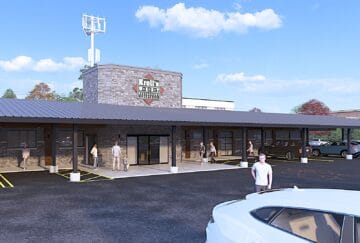 ‘It’s time for the building to have a fresh look’
‘It’s time for the building to have a fresh look’ Pharmacy innovation meets family values in Shawano
Pharmacy innovation meets family values in Shawano

